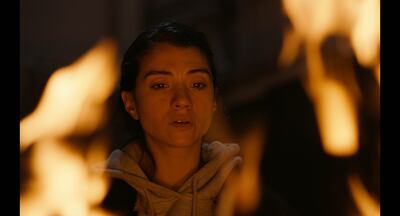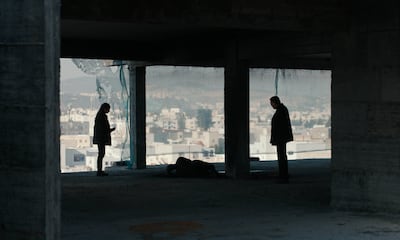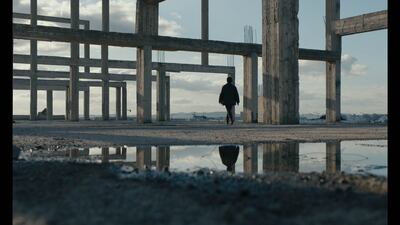A disquieting thriller that blends police procedural tropes with off-kilter elements of sci-fi, Ashkal marks an impressive feature debut by Tunisian-born filmmaker Youssef Chebbi. Having its premiere at Directors' Fortnight at this year’s Cannes Film Festival, the film is set in the Gardens of Carthage district in Tunis in the aftermath of the 2011 Arab uprising. It’s an evocative setting for a murder-mystery that has an air of David Lynch about it.
After public demonstrations led to the ousting of President Zine El Abidine Ben Ali, construction stopped on buildings in this district, leaving a concrete jungle of unfinished apartment blocks. “Little by little”, the opening caption tells us, building work has begun again.
In the midst of this, the action plays out. A burnt body is found at a building site. Was it a suicide? The dead man’s colleagues are certain it wasn’t, and other evidence backs this up. There was no sign of bruising, a usual trait when someone set themselves alight, bumping into anything in the vicinity. And why set fire to yourself alone, far from public view, if you are making a protest?
Two police officers, Fatma (Fatma Oussaifi) and Batal (Mohamed Houcine Grayaa), are assigned to the case, but less than a week later, a second burnt body is found, this time a female. A coincidence? Fatma, in particular, thinks not. Eventually, two witnesses will come forward and claim they saw a man approach the second victim.
“I swear, he gave her fire with his hand,” says one. But both were drinking, their evidence not to be trusted.
At the same time, the Truth and Dignity Commission is investigating police corruption and torture, and there’s a sense that violence is seeping from every pore in the city. The Commission’s reporting will be anything but smooth, after more corpses — including a police officer's — begin to stack up.

Chebbi, who previously made shorts (including the human trafficking tale Vers le Nord) and the prize-winning 2012 documentary Babylon, shows real assurance here, both working with his cast and conjuring up an indelible atmosphere. There’s a strong vision, with a particularly impressive use of sound design (another facet that would no doubt seal the approval of Lynch), as eerie echoes flood the film’s soundscape.
As the story unfolds, the mystery gets all the more bizarre, with markings on walls, videos of immolations, and the dawning belief that something otherworldly going on. Amid this, Fatma and Batal are like a latter-day Mulder and Scully, the detective pairing from The X-Files who investigated paranormal activity.
Curiously, Ashkal is not the only film in Cannes this year to feature a dogged female detective; Ali Abbasi’s competition entry Holy Spider involves a journalist — played by Zar Amir-Ebrahimi — on the trail of Iran’s true-life ‘Spider’ killer, who took it upon himself to murder prostitutes as he waged war against sin.

Chebbi’s film, however, moves away from step-by-step detective work and into something more undefinable. Is it about terrorism? Is it about political protest? It’s not easy to say. It’s a film where little is explained — and perhaps as a viewer you won’t want the spell broken with pat answers.
Instead, the director leans heavily into an unsettling mood in the final third, teasing us with the supernatural/sci-fi. With impressive cinematography from Hazem Berrabah, whose lighting of those unfinished concrete structures lends the film a feel of creeping dread, it’s an unnerving experience.
The film’s final haunting image — one that will benefit being seen on the biggest screen possible — will linger long after the credits have rolled.
The Cannes Film Festival runs until Saturday, May 28.

